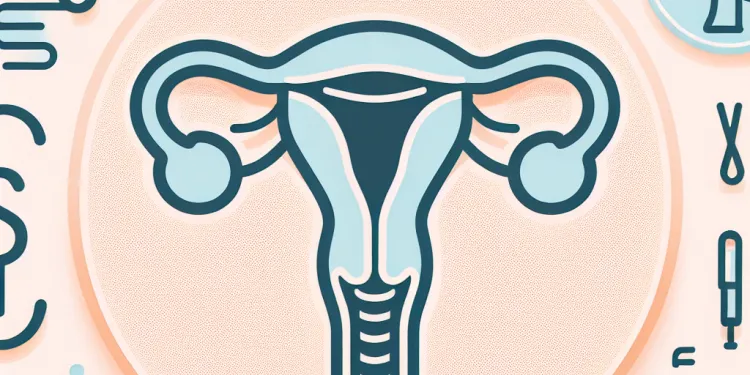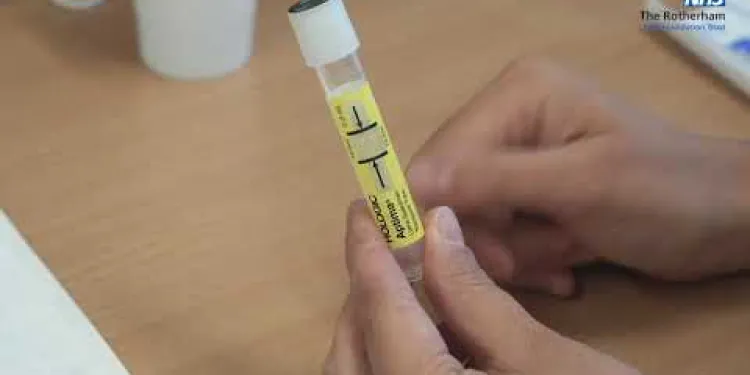
Find Help
More Items From Ergsy search
-

Will the test affect my menstrual cycle?
Relevance: 100%
-

Can the test be performed during my menstrual period?
Relevance: 63%
-

Heavy periods (heavy menstrual bleeding)
Relevance: 45%
-

Can I use Ibuprofen for menstrual pain?
Relevance: 45%
-

How long does an IVF cycle take?
Relevance: 43%
-

What is the Womb Lining test?
Relevance: 42%
-

What are the main steps in an IVF cycle?
Relevance: 41%
-

Is cycling safe during pregnancy?
Relevance: 38%
-

Is the womb lining test painful?
Relevance: 35%
-

When should I take a pregnancy test?
Relevance: 35%
-

Why is a womb lining test performed?
Relevance: 33%
-

What should I do if I get unclear results on a pregnancy test?
Relevance: 33%
-

Can stress affect a pregnancy test result?
Relevance: 33%
-

How should I prepare for a womb lining test?
Relevance: 32%
-

Irregular periods - BSL
Relevance: 31%
-

What you need to know about irregular periods
Relevance: 30%
-

Is a womb lining test painful?
Relevance: 30%
-

How is the womb lining test performed?
Relevance: 30%
-

What happens after a womb lining test?
Relevance: 29%
-

What is the womb lining test?
Relevance: 27%
-

Can a womb lining test detect cancer?
Relevance: 27%
-

Are there any risks associated with the womb lining test?
Relevance: 26%
-

Does the womb lining test require any special preparation?
Relevance: 25%
-

Are there risks associated with a womb lining test?
Relevance: 24%
-

How is a womb lining test conducted?
Relevance: 24%
-

What if my pregnancy test is positive?
Relevance: 23%
-

Is there an autism test?
Relevance: 23%
-

Can I order a FIT test online?
Relevance: 22%
-

How soon can a pregnancy test detect pregnancy?
Relevance: 22%
-

What is a pregnancy test?
Relevance: 22%
-

Is HPV testing available?
Relevance: 22%
-

Are digital pregnancy tests more accurate than non-digital tests?
Relevance: 22%
-

Getting tested for Chlamydia
Relevance: 22%
-

What is PSA testing?
Relevance: 22%
-

Having a blood test
Relevance: 22%
-

Ovarian cancer - signs and symptoms to look out for
Relevance: 21%
-

Can a pregnancy test expire?
Relevance: 21%
-

Sexual Health - HIV Testing
Relevance: 21%
-

How often should I perform a home colorectal cancer test?
Relevance: 21%
-

Urine test for Gonorrhoea and Chlamydia
Relevance: 21%
Will the Test Affect My Menstrual Cycle?
Understanding Menstrual Cycles
The menstrual cycle, a natural biological process in women, typically spans 28 days, though it can vary. It involves hormonal changes preparing the body for pregnancy, starting with the follicular phase, ovulation, and the luteal phase, followed by menstruation if pregnancy does not occur. Various factors influence these cycles, including stress, lifestyle, and health changes.Medical Tests and Their Impact
Concerns about medical tests affecting menstrual cycles are common. Routine tests, like blood work or imaging, generally do not interfere with menstrual cycles. However, some diagnostic procedures involving hormonal treatments could potentially alter the cycle. For example, a test involving hormonal injections or medications might affect regularity temporarily. Always consult healthcare professionals before undergoing such tests to discuss potential side effects.Stress and Menstrual Irregularities
It's important to consider indirect effects, such as stress, which can influence menstruation. Stress from anticipating or experiencing a medical test may disrupt hormonal balance, potentially leading to irregular menstrual cycles. Stress management techniques, like relaxation exercises, can help mitigate these effects.Seeking Medical Advice
For UK residents, accessing reliable healthcare resources, such as the NHS website, can provide guidance. If you experience significant menstrual changes following a test, consult a healthcare provider. They can offer specific advice, evaluate if the test directly or indirectly influenced your cycle, and suggest appropriate interventions if necessary.Conclusion
While most medical tests do not directly affect menstrual cycles, some exceptions exist, particularly where hormonal interventions are involved. Stress and anxiety related to medical assessments can also play a role in cycle irregularities. It’s crucial to remain informed and consult healthcare providers to ensure any concerns are adequately addressed.Will the Test Affect My Period?
Understanding Periods
A period is part of a natural cycle for girls and women. This cycle usually lasts about 28 days, but it can be different for each person. The cycle happens because of changes in the body that help get ready for a baby. It starts with a time when the egg gets ready, then the egg is released, and if no baby happens, a period comes. Many things can change this cycle, like stress, how we live, and being sick.How Tests Might Affect Periods
People often worry if tests from the doctor will change their period. Most tests, like blood tests and scans, do not change periods. But some tests that use special medicines can change the cycle. For example, if a test uses hormone injections or medicine, it might make the cycle different for a short time. It is important to talk to a doctor before such tests to know what might happen.Stress and Changes in Your Period
Stress is important to think about too. Worrying about a test might make you stressed, and stress can change your hormones. This might make your period late or different. Doing things to relax, like deep breathing, can help keep stress low.Getting Help from a Doctor
In the UK, you can find good help on the NHS website. If you notice your period changes a lot after a test, talk to a doctor. They can tell you more about why this happened and what to do next.In Summary
Most doctor tests do not change periods, but some tests with hormones might. Stress from tests can also change your cycle. It's important to talk to your doctor if you have worries. They will help answer your questions and find the best way to help you.Frequently Asked Questions
Can a medical test affect my menstrual cycle?
Some medical tests, especially those involving hormones, can temporarily affect your menstrual cycle. It's best to consult with your healthcare provider for specifics.
Will a blood test interfere with my period?
A standard blood test typically does not interfere with your menstrual cycle.
Could a thyroid test impact my menstruation?
A thyroid test itself does not affect menstruation, but thyroid imbalances can impact your cycle.
How might a hormone test affect my period?
Hormone tests might not directly affect your cycle, but the results can give insights into any cycle irregularities.
Does having an MRI scan change my period?
An MRI scan does not impact your menstrual cycle.
Will undergoing a CT scan affect my menstrual pattern?
There is no evidence that a CT scan affects menstrual patterns.
Can a Pap smear test influence my period?
A Pap smear test should not affect your menstrual cycle, although it may cause slight spotting.
Does taking a pregnancy test alter my cycle?
Taking a pregnancy test does not affect your menstrual cycle.
Could getting blood drawn affect my period timing?
Having blood drawn usually does not alter the timing of your period.
Can medical testing stress affect my menstruation?
Stress from medical testing could potentially cause temporary changes in your menstrual cycle.
Will an ultrasound scan have any effect on my period?
An ultrasound scan does not affect your menstrual cycle.
Does a colonoscopy procedure influence menstrual cycles?
A colonoscopy should not interfere with your menstrual cycle.
Can a mammogram affect when I get my period?
A mammogram does not have an impact on the timing of your period.
Will allergy testing change my menstrual cycle?
Allergy testing does not typically affect your menstrual cycle.
Does fasting for a test impact menstruation?
Short-term fasting for a test generally does not affect your menstrual cycle, but prolonged dietary changes might.
Can a medical test change my period?
Some medical tests can change the way your period comes, especially tests about hormones. It is a good idea to talk to your doctor to learn more.
Will a blood test affect my period?
A blood test does not change or stop your period.
If you have questions, you can talk to a doctor or nurse.
It can help to write down your questions before you go to the doctor.
A regular blood test usually does not bother your period.
Can a thyroid test change my period?
A thyroid test does not change your periods, but if your thyroid is not working right, it can change your periods.
How can a hormone test change my period?
A hormone test checks the levels of special chemicals in your body. These chemicals are called hormones.
This test might change your period. Your period is the time of the month when you bleed.
If you are worried or have questions, talk to a doctor or nurse. They can help explain things.
You can also use tools like pictures or videos to help understand more.
Hormone tests do not change your period. But they can help you understand why your period might not be regular.
Can an MRI scan change my period?
An MRI scan does not change your period.
Will a CT scan change my periods?
A CT scan is a special picture that doctors use to look inside your body.
Having a CT scan will not change how your periods happen. Your periods will stay the same.
If you are worried, you can talk to your doctor or a nurse. They can help explain things to you.
It can help to write down questions you have before you see your doctor.
A CT scan does not change your period.
Can a Pap test change my period?
A Pap smear test won't change your period. You might have a little bleeding.
If you find this hard to read, try using a plain font or a text-to-speech tool to help you. You can also ask someone to read it with you.
Will a pregnancy test change my period?
No, taking a pregnancy test won't change your period. It just tells if you're pregnant or not.
If you're finding it hard to understand or remember this, you could:
- Ask someone you trust to explain it to you.
- Use a calendar to keep track of your period.
- Watch a video about how pregnancy tests work.
Using a pregnancy test does not change your period.
Can having a blood test change my period timing?
Getting a blood test usually does not change when your period comes.
Can stress from medical tests change my period?
Feeling worried about medical tests can sometimes change when you get your period for a little while.
Can an ultrasound scan change my period?
An ultrasound scan does not change your period.
Can a colonoscopy change your period?
A colon check-up should not affect your period.
Can a breast x-ray change when I have my period?
A breast x-ray is called a mammogram. It does not usually change your period. If you are worried or have questions, talk to a doctor. A friend or family member can help you understand too.
A mammogram does not change when your period will start or stop.
Can allergy testing change my period?
Allergy tests usually do not change your period.
Does not eating before a test change your period?
Not eating for a short time for a test usually does not change your periods. But if you change how you eat for a long time, it might change your periods.
Useful Links
This website offers general information and is not a substitute for professional advice.
Always seek guidance from qualified professionals.
If you have any medical concerns or need urgent help, contact a healthcare professional or emergency services immediately.
Some of this content was generated with AI assistance. We’ve done our best to keep it accurate, helpful, and human-friendly.
- Ergsy carfully checks the information in the videos we provide here.
- Videos shown by Youtube after a video has completed, have NOT been reviewed by ERGSY.
- To view, click the arrow in centre of video.
- Most of the videos you find here will have subtitles and/or closed captions available.
- You may need to turn these on, and choose your preferred language.
- Go to the video you'd like to watch.
- If closed captions (CC) are available, settings will be visible on the bottom right of the video player.
- To turn on Captions, click settings .
- To turn off Captions, click settings again.
More Items From Ergsy search
-

Will the test affect my menstrual cycle?
Relevance: 100%
-

Can the test be performed during my menstrual period?
Relevance: 63%
-

Heavy periods (heavy menstrual bleeding)
Relevance: 45%
-

Can I use Ibuprofen for menstrual pain?
Relevance: 45%
-

How long does an IVF cycle take?
Relevance: 43%
-

What is the Womb Lining test?
Relevance: 42%
-

What are the main steps in an IVF cycle?
Relevance: 41%
-

Is cycling safe during pregnancy?
Relevance: 38%
-

Is the womb lining test painful?
Relevance: 35%
-

When should I take a pregnancy test?
Relevance: 35%
-

Why is a womb lining test performed?
Relevance: 33%
-

What should I do if I get unclear results on a pregnancy test?
Relevance: 33%
-

Can stress affect a pregnancy test result?
Relevance: 33%
-

How should I prepare for a womb lining test?
Relevance: 32%
-

Irregular periods - BSL
Relevance: 31%
-

What you need to know about irregular periods
Relevance: 30%
-

Is a womb lining test painful?
Relevance: 30%
-

How is the womb lining test performed?
Relevance: 30%
-

What happens after a womb lining test?
Relevance: 29%
-

What is the womb lining test?
Relevance: 27%
-

Can a womb lining test detect cancer?
Relevance: 27%
-

Are there any risks associated with the womb lining test?
Relevance: 26%
-

Does the womb lining test require any special preparation?
Relevance: 25%
-

Are there risks associated with a womb lining test?
Relevance: 24%
-

How is a womb lining test conducted?
Relevance: 24%
-

What if my pregnancy test is positive?
Relevance: 23%
-

Is there an autism test?
Relevance: 23%
-

Can I order a FIT test online?
Relevance: 22%
-

How soon can a pregnancy test detect pregnancy?
Relevance: 22%
-

What is a pregnancy test?
Relevance: 22%
-

Is HPV testing available?
Relevance: 22%
-

Are digital pregnancy tests more accurate than non-digital tests?
Relevance: 22%
-

Getting tested for Chlamydia
Relevance: 22%
-

What is PSA testing?
Relevance: 22%
-

Having a blood test
Relevance: 22%
-

Ovarian cancer - signs and symptoms to look out for
Relevance: 21%
-

Can a pregnancy test expire?
Relevance: 21%
-

Sexual Health - HIV Testing
Relevance: 21%
-

How often should I perform a home colorectal cancer test?
Relevance: 21%
-

Urine test for Gonorrhoea and Chlamydia
Relevance: 21%


